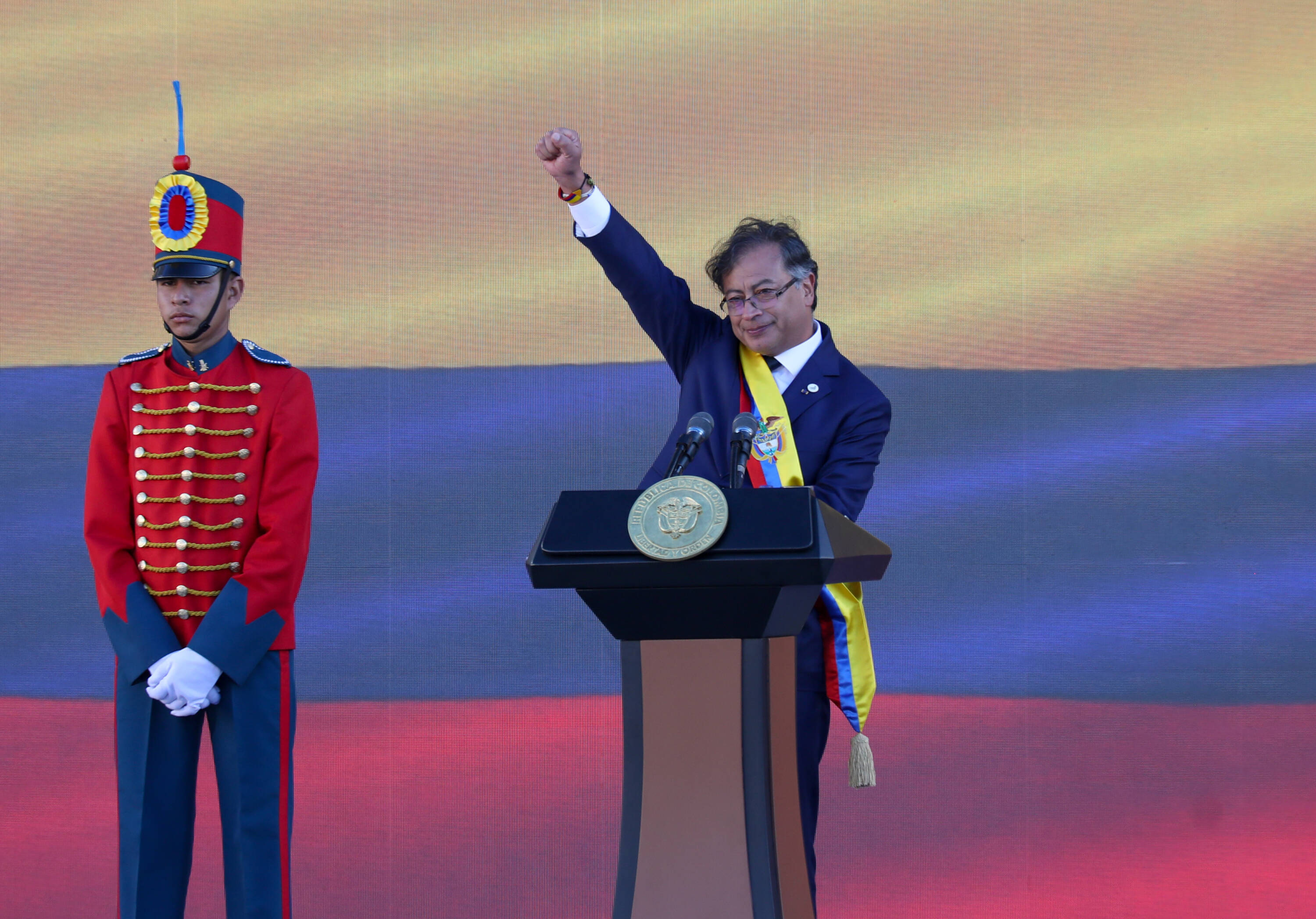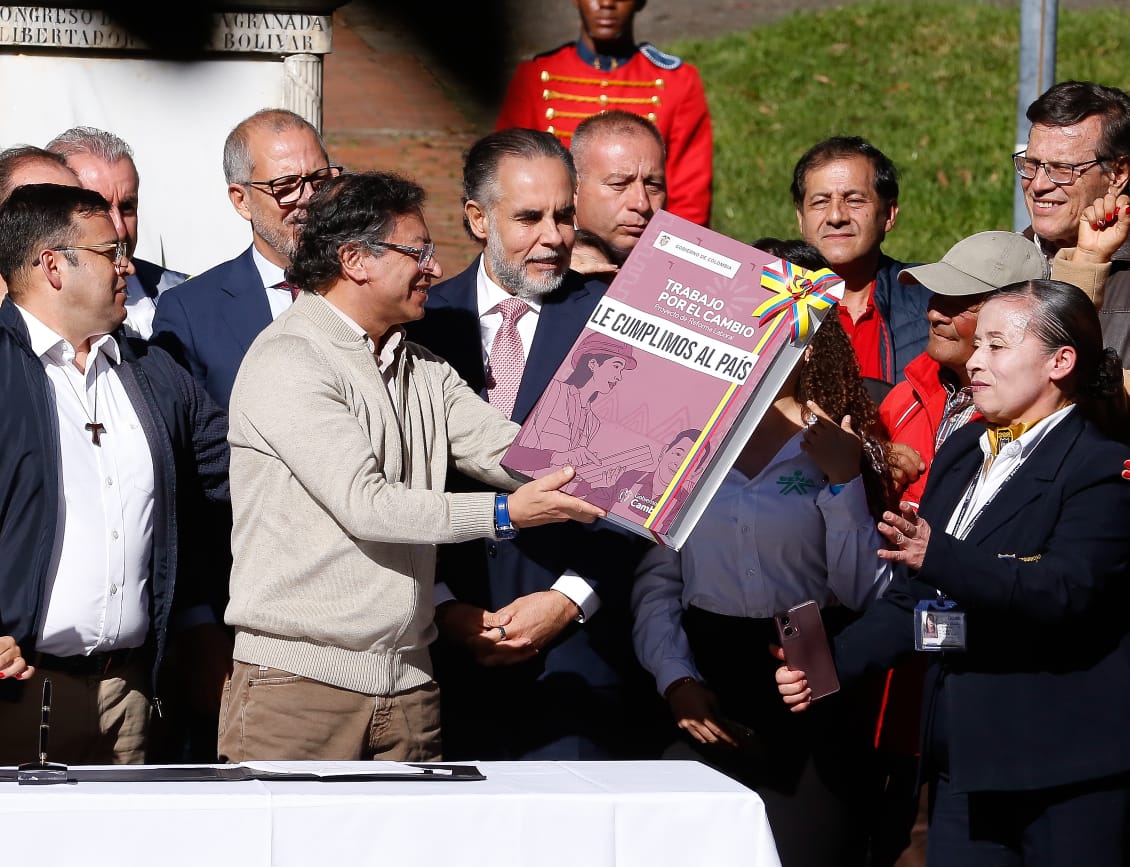There are still surprises / Analysis by Ricardo Ávila

A quick internet search is enough to find images of that August 7, 2022, event in Bogotá's Plaza de Bolívar, when Gustavo Petro was sworn in as President of the Republic . The cheerful faces of those in attendance and the sunny afternoon were interpreted as the preamble to a new era, marked by harmony and unity. As a phrase from the inaugural speech put it: "Today begins the Colombia of the possible."
Three years later, many of the dreams outlined at that time seem unrealizable, starting with that of true and lasting peace . To say that the road has been tortuous barely captures the nearly 1,100 days that have passed since the "Government of Change" began.

There's almost a year left until the end of the Petro administration. Photo: Mauricio Moreno
There's no doubt that, given this winding, twisting, or zigzagging process, expectations are high regarding what might happen over the remaining twelve months of the current administration. While the arrival of the election season traditionally combines with the urgency of an executive branch trying to conclude its initiatives and preserve its legacy, the climate is even more charged now than on previous occasions.
Fronts such as public order, international relations, and the economy present significant challenges. Added to this is the pugnacity of a president who long ago abandoned his promises of seeking unity and opted to play the polarization card to ensure the continued power of the Historic Pact.
Even if the current situation regarding domestic demand and employment is favorable—as reflected in increased consumer confidence—the deterioration in fiscal figures poses a huge risk.
Although largely unpopular, Petro's approval ratings exceed those of his two predecessors a year before leaving office. After the dip in approval ratings he experienced following the assassination attempt on Miguel Uribe's life, the most recent polls show a recovery that has him back to over 30 percent support.
This support gives him sufficient room to maneuver to contain his critics and dominate what is known as "the national conversation." No one else currently has the capacity to set the agenda and generate headlines, magnified by a massive information machine that ranges from the public news network to the budget-funded wineries that operate on social media.

Challenges remain in public finance. Photo: iStock.
As analyst Leonardo García points out, "even without a parliamentary majority or clear results on many issues, Petro has managed to make the country revolve around his words." He adds that "he not only communicates, but also forces the media and opinion leaders to react, thereby establishing himself as the great narrator of what is happening."
Now the big question is whether the bid will be doubled to guarantee victory at the polls. Achieving this goal begins with a very strong result in the March legislative elections, which is crucial for what lies ahead in the presidential elections in May.
Therefore, even if the work of the Nariño House sometimes seems chaotic, it must be understood that there is a clear direction around which government action is governed. Seen in disorder, the pieces of the puzzle appear meaningless; but when they fit together, the sign "elections 2026" emerges with complete clarity.
The journey With that sort of promised land in sight, it's worth identifying the means that would make the goal achievable. Since the famous televised cabinet meeting at the beginning of the year, it has been clear that the key word is radicalization, something that had to do with the conviction that Congress would not process the reforms proposed by the administration.
After the collapse of the labor reform in March, there was a clash with the legislature, which included the call for a referendum, accompanied by the "decree" that supposedly gave life to the mechanism. Raising the stakes served to revive the initiative, with the well-known outcome after ninety days of controversy.

The President signed the labor reform on June 25 at the Quinta de Bolívar in Bogotá. Photo: Néstor Gómez / EL TIEMPO
That confrontational attitude remains in place. Far from the unwritten rule that the pre-election session was devoted to what was strictly necessary to allow parliamentarians sufficient time to campaign in their regions, there are now three main topics: submission to the courts, tax reform, and healthcare reform.
Anyone who has been to the Capitol knows that moving forward with such large-scale projects is practically impossible, especially amid the current tensions. But any refusal will serve as a catalyst for Petro to resume his "they won't let me" stance and insist that the senators and representatives who oppose him must be reappointed, leading to multiple skirmishes on both sides.
The war of positions includes the debate surrounding the national budget. With such a high spending program, which largely depends on the approval of additional tax burdens, everything points to the same outcome as last year: a lack of agreement between the parties, the outcome of which will be the issuance of an executive decree.
Contrary to what happens in parliamentary democracies, where budget items from the current fiscal year are repeated if there is no majority to support the government's proposal, what happened in 2024 opened a Pandora's box in Colombia. As things stand, it is more profitable for the administration to start with a larger figure that includes many allocations and then decide autonomously what to postpone or what to implement. This is also a way to reward friends and punish opponents without having to negotiate with members of Congress.
There is no shortage of analysts who, in this scenario, contemplate the possibility that the Casa de Nariño (Casa de la Justicia) might decide to use the economic emergency. Issuing regulations that are presented as a blow to the wealthiest or certain companies could be a way to curry favor with certain sectors of public opinion, even if the Court's review later reverses them.
And, speaking of ways to win over the public, other issues are emerging on the horizon. One of them is the intention to manipulate electricity rates, so that users experience a significant reduction in their bills. The offensive against XM, which manages the wholesale kilowatt market, is part of this strategy.

Edwin Palma, Minister of Mines, attended a meeting with the XM board of directors. Photo: Private archive
Doing something like this would put many companies in the industry in serious trouble and bring more than one to the brink of collapse. But it must be emphasized that the sector's financial viability could be overshadowed by the desire to score points with voters, even if a crisis hits a few months later.
Nor does respect for the independence of the Bank of the Republic matter, as was evident last Friday. After lamenting that the bank had not lowered the interest rate it sets, the President of the Republic stated on X that it is a matter of "halting economic growth for a political purpose," while affirming that the drop in inflation is a government success, not a success of the Bank.
Raise the bar Permanently using confrontation is one of the scenarios contemplated by Alejandro Gaviria, who served in Gustavo Petro's cabinet during his first term. "Thinking about an extrapolation of what has been happening seems most likely, even if the high-flown rhetoric increases in volume," says the former minister.
This adds a second possibility, consisting of much stronger institutional clashes. For example, ignoring the Constitutional Court's order to lift the intervention of the EPS Sanitas, or issuing decrees that go beyond the powers of the Executive Branch.
While he considers it unlikely, Gaviria says, "I don't completely rule out attempts to produce an institutional rupture, aimed at prolonging the presidential term with the argument that a constituent assembly will be convened." Not to go any further, the head of the presidential office, Alfredo Saade, reacted to the news that the doors to Nayib Bukele's indefinite reelection had been opened in El Salvador with, "The same thing will happen in Colombia. How great."
Once again, the key to deciphering what's coming lies in the desire for power. "Petro doesn't govern solely with his mandate in mind, but rather with the consolidation of a long political cycle in mind," says Leonardo García.
Having stated this, it's worth remembering that reality is dynamic. Even if the Nariño House has a defined objective, that doesn't mean it's fully committed, as there are clear signs of exhaustion among segments of society that once supported it. Added to this are the mistakes made by a weak governing team, rife with rivalries.
It's true that the dozens of presidential candidates currently running give the impression of a scattered opposition, something that favors the Historic Pact. However, as the months pass, the number of candidates will dwindle, and the race will begin. Here, as García points out, "the real challenge will not simply be to defeat Petrism at the polls, but to articulate a legitimate alternative that offers direction to a society exhausted by uncertainty, institutional fragmentation, and exclusionary rhetoric."
Until that moment arrives, economic risks remain. Thus, while the current situation regarding domestic demand and employment is favorable—as reflected in increased consumer confidence—the deterioration in fiscal figures poses a huge risk.
To date, international markets have been relatively tolerant of Colombia, but circumstances can change overnight if bondholders decide to liquidate their positions and push the exchange rate upward. No one can guarantee that this will be the case at any given date, but there is no doubt that the outlook for public finances is even worse than it was just a month ago, with no clear intention to change the course of events.
Aside from the above, electoral uncertainty will continue to weigh on the private sector's sentiment. Aside from the fact that it has little chance of success, the announcement of the tax reform does not help the performance of productive investment, which has been in decline for some time.
Due to this and other factors, there's no choice but to remain vigilant in the coming months. It's one thing to remain optimistic and hope for a smooth election, and another to lower our level of alert in the face of the actions of a government that will play the radicalization card as often as possible. A cool head and wide-open eyes are what's required during these twelve months, during which shocks for Colombia will be the norm, not the exception.
eltiempo





